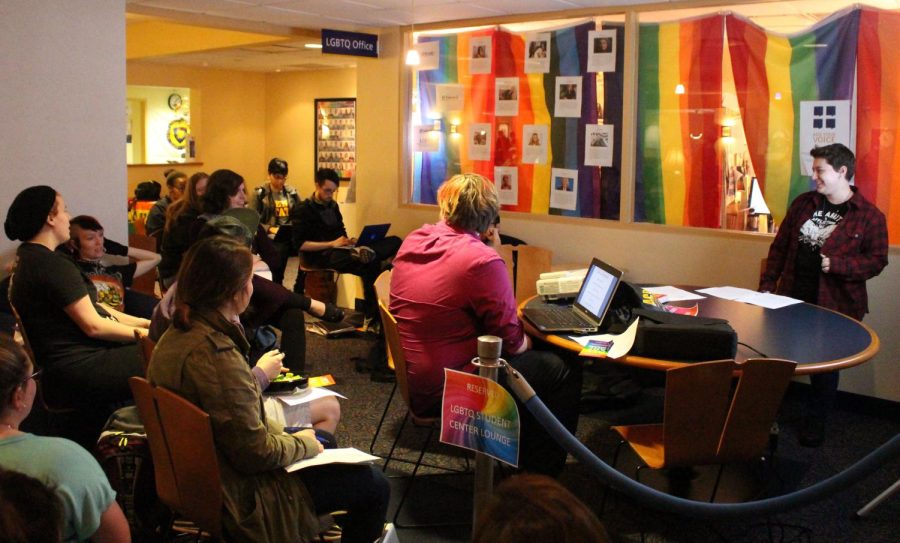Masculinity vs Femininity: The LGBTQ Student Center Hold Roundtable Discussion
Kent State students meet for the LGBTQ round table discussion downstairs of the student center on Tuesday, March 15, 2016.
March 15, 2016
The LGBTQ Student Center held a roundtable Masculinity vs. Femininity discussion about the grips on gender roles, LGBTQ stereotypes and stigmas in the Student Center on Tuesday.
The LGBTQ Student Center represents the lesbian, gay, bisexual, transgender and queer community and is dedicated to providing programming that spreads education across the campus. It caters to the sexual and gender minority community as well as its allies, and serves as a safe and educating space for all students and staff.
Irene Altieri, a freshman chemistry major, is one of 10 interns who the LGBTQ Student Center takes each semester. She is in charge of this month’s discussion tables.
“A lot of people can feel shut out when they don’t have that type of connection with other people, so if they have that little community or group of people that they can talk to and relate to, it definitely helps not only their self-esteem, but also their mental well-being,” Altieri said. “So having this center is really important.”
Altieri said she thinks it’s important to talk about the different social norms taking place, like the different gender roles society has put on people.
“In the discussion, I’m really delving into how feminine gay men and masculine gay men are viewed and comparing them,” she said. “Also, (with) gay men and trans men, trans women and gay women; just comparing how they’re viewed, too because feminine gay men are perfectly accepted for the most part in society, but if you see a trans man show any sort of femininity, people freak out.”
During the discussion, Altieri presented a PowerPoint with the topics she felt were most important to discuss. They ranged from gender roles, gender non-conforming clothing brands, proper etiquette when talking to someone who identify as LGBTQ and the definitions of masculinity. She further spoke on femininity and androgynous, where she used celebrities like Ruby Rose and David Bowie as examples.
The most common offensive questions was the statement “you’re too pretty to be gay” and the question, “how do you have sex?” Everyone also agreed the question “how do you identify as?” is better stated, as opposed to asking “what are you?”
Altieri also touched base on the difference between equality and equity, where equality is defined as sameness and equity is defined as fairness.
“I think that all people should be given the sameness,” said Alice Freitas, a freshman psychology major. “Labels are a shorthand; it’s an abbreviation. It gives everybody an easier way to categorize people … that is how humans work … we are most comfortable if we can put people’s traits in boxes.”
Freitas said the most effective way to get ride of stereotypes and stigmas is to “sit down and have real conversations about what these mean to us.”
Ken Ditlevson has been the LGBTQ Student Center Director since November 2014.
“It is hugely important,” Ditlevson said. “ Feeling like you belong to something, that you have a connection in a place that you can meet friends or potential dates and people just to relate to, (and) that you feel some support and similarities.”
After coming out as a gay man following his high school graduation, Ditlevson was connected to an LGBTQ Center in Cleveland, which he credits for saving his life and providing him with a safe, open-minded community.
“People feel alone and isolated and that there’s not a place for them … that’s totally what we don’t want at Kent State,” Ditlevson said. “Everyone should be able to feel like they can be themselves and that there’s a place for them.”
The LGBTQ Student Center is located downstairs in the Student Center and is open to everyone. It offers mentorship programs as well as a friend and family environment and general education. More information on services offered and upcoming events can be found on their website at https://www.kent.edu/lgbtq.
Sierra is a student life reporter for The Kent Stater. Contact her at [email protected].












